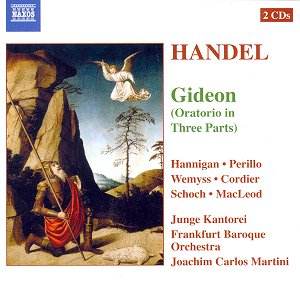After Handelís death
in 1759 his assistant, the younger John
Christopher Smith, continued the tradition
of regular oratorio performances, in
some cases compiling new works from
the Handel manuscripts he had inherited.
The oratorio Gideon, first performed
ten years after Handelís death, sets
a new libretto by Handelís former collaborator
Thomas Morell. The story deals with
Gideonís destruction of the idol Baal,
the defeat of the Midianites and the
miracle of the fleece. In this it bears
close resemblance to many of Handelís
other oratorio themes. The music used
draws heavily on some of Handelís finest
early works, with a lesser number of
elements (principally Handelian recitatives)
by John Christopher Smith himself. Smithís
close association with Handel certainly
gave him a sure grasp of the masterís
manner of word setting, even if Smiths
own musical gifts were slight.
Among Smithís principal
sources for the arias and choruses are
the great psalm settings Handel wrote
in Rome as a young man; Nisi Dominus
and Dixit Dominus. The latter
work in particular has become very well
known in our own times, but would not
have been so familiar to the staunchly
protestant 18th century London
audience. Smith could have relied on
a certain coup aspect when presenting
this wonderfully vigorous music with
English words and a good Old Testament
story, and indeed it makes the transition
extremely well. The first chorus sets
the manner, using the marvellous Dominus
a dextris movement of the Dixit
Dominus and it was no hard guess
to work out that the final chorus of
the oratorio was likely to be the splendid
closing Gloria Patri of the same
psalm. Indeed, so it turns out, transformed
into a Wonderous are Thy works, O
Lord! with the same Amen as the
original model. These contrafacta give
Gideon an odd sense of familiarity,
disturbed only by the occasional realisation
that the movements are not in the familiar
order.
The recording is a
live performance, with studiously avoided
audience applause, recorded on a single
occasion. As such the quality is commendable.
The singers are uniformly excellent,
although there are a few quibbles. The
high countertenor David Cordier (not
nearly as well known in his native England
as he should be, having made his career
largely in Germany) is one of the few
countertenors capable of handling the
high soprano castrato roles of Handelís
operas. However, some of the writing
here stretches his lower limits somewhat
uncomfortably. The tenor Knut Schoch
sings the title role with generally
excellent English, although there are
occasions where the vowel sounds of
English do seem to cause his vocal sound
to take on a hard edge. However, these
must be viewed as minor quibbles in
a context that is usually excellent.
Certainly the three sopranos are consistently
admirable, especially the delightfully
piquant voice of Barbara Hannigan Ė
a voice that this reviewer would take
out for dinner any time. The Swiss bass
Stephen MacLeod, although having fairly
little to do in the various roles of
a Prophet, a Priest of Baal and Joash
(Gideonís father) sings them all with
appropriately Handelian gravitas and
a consistently rich vocal quality, but
never lacking clarity or focus in the
runs.
The singers are supported
by imaginative continuo, making much
use of the theorbo, (about which one
does wonder slightly, given the 1769
date of the work. This seems rather
too late for theorbo use in performance,
although obviously not for the music
itself, mostly composed decades earlier,
but Smithís venues in late 1760s London
would presumably have been much larger
than those of Romeís private apartments
in which Handel was working in the 1720s,
which does argue against the viability
of the theorbo, as opposed to a decent
sized harpsichord or an organ) and amongst
the players the oboes and the trumpets
and drums are excellent. The string
band of the Frankfurt Baroque Orchestra
is not of the calibre of the better
known Freiburg or Amsterdam Baroque
Orchestras. This is not to say that
there is not quality here Ė the playing
is certainly sprightly, and often expressively
lyrical in the slow movements. The slight
grievance comes in the blending of the
upper strings. Too often there is just
a little too much roughness in the edge
of the sound. This is an aspect that
need not exist given careful orchestral
rehearsal, but one does get the feeling
that the principal rehearsal time is
devoted to the chorus (which is very
competent and frequently exciting),
and the band are assumed to be able
to manage. This is probably perfectly
true, but does make the distinction
between those baroque orchestras that
are made of fine players, and those
that are themselves fine orchestras.
The Frankfurt Baroque Orchestra could
take themselves a level higher.
Given, however, that
there is no other recording of this
work available, one cannot be too picky
about the niceties of string sound polish,
and as this Naxos release represents
the usual excellent value for money
of this label it is hard not to be positive
in recommending this Handel rarity.
It is an enjoyable performance of (often)
familiar music, given an interesting
new flavour.
Peter Wells
see also review
by Jonathan Woolf


